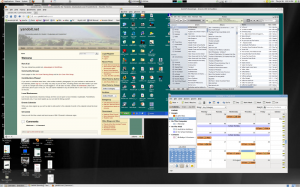Windows and Mac are familiar to all, but there is another: Linux. It is completely free, open source software. Linux used to be ‘just for geeks’, but today’s Linux looks and feels much like Windows.
Linux is very stable and reliable, which is why it is so popular for web servers. Yandoit.net is hosted on a Linux server, somewhere in the US.
Various companies and communities create and package their own variety of Linux. These are called ‘distributions’. Most are free to download. The most popular distribution, and the one I use, is Ubuntu. You can download it here and burn it to a CD, which you can then install, or try it out by running it directly from the CD.
Ubuntu includes all the basic software you need, including the OpenOffice suite (word processing, spreadsheet and presentations), Firefox web browser, email/calendar application, graphics, media player, CD/DVD burner and games. There is also a huge online repository of extra software to choose from, all free.
Linux facts…

Linus Torvalds
There are no Linux viruses so you don’t need anti-virus software.
Depending on which survey you read, around 70% of the world’s web servers run Linux.
Of the world’s top 500 supercomputers, 91% run Linux[1]. The fastest supercomputer in the world, IBM’s Sequoia, runs Linux.
Linux is built and maintained by a community of enthusiasts. Its core was written by Linus Torvalds, commencing in 1991. Since then it has developed from a rather plain and technical system mainly of interest to programmers, to a fully-fledged desktop system: a worthy rival to Windows and Mac OSX.
PC repairers (myself included) often use Linux (installed on a USB stick or CD) to kick-start a borked Windows machine and recover its files.
You can try out Linux (without installing it or making any changes to your computer) by running it from a CD or USB stick.

Screenshot of Ubuntu (click to enlarge)
References
1. TOP500.org. “Operating system Family share for 06/2010 | TOP500 Supercomputing Sites”. Top500.org. http://www.top500.org/stats/list/35/osfam. Retrieved 2010-06-01.






